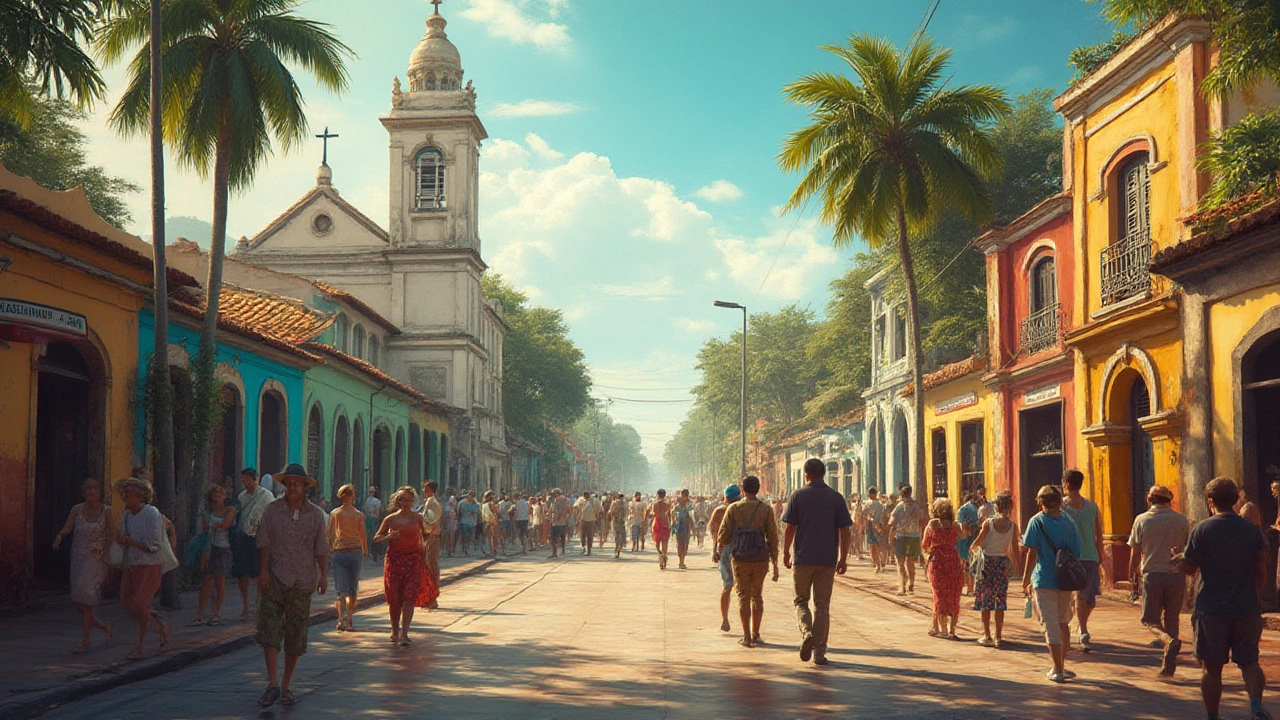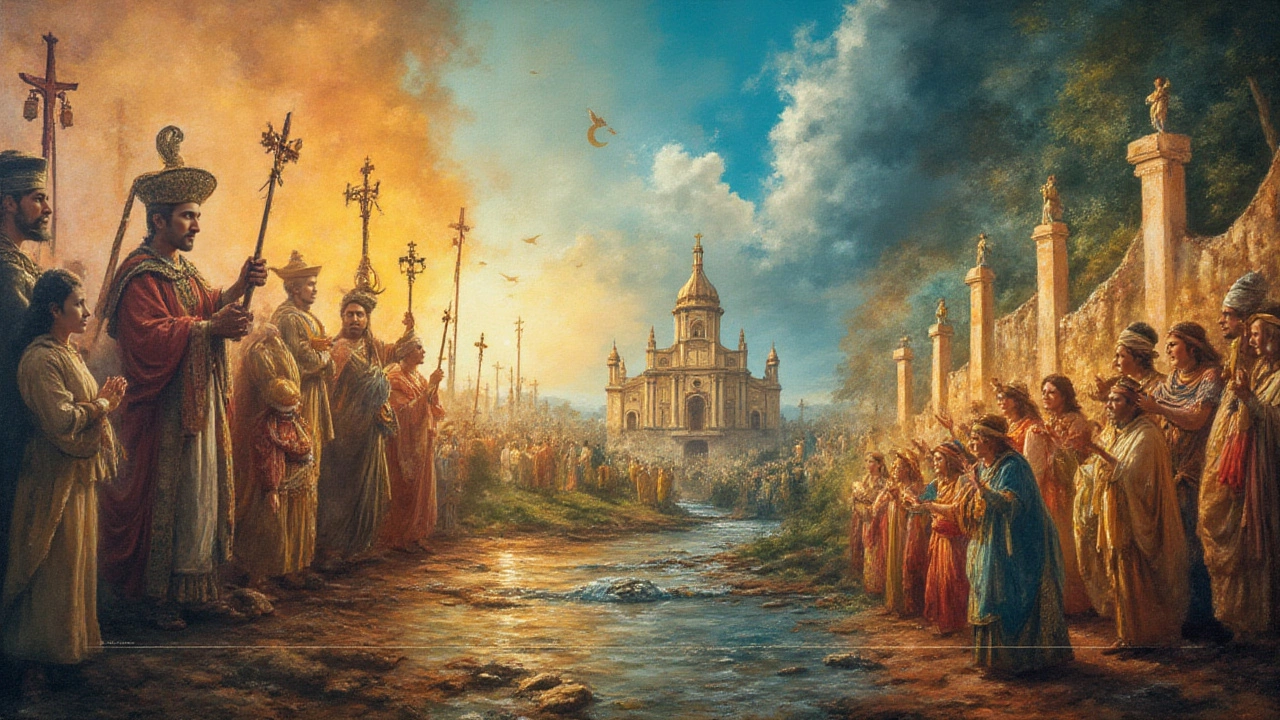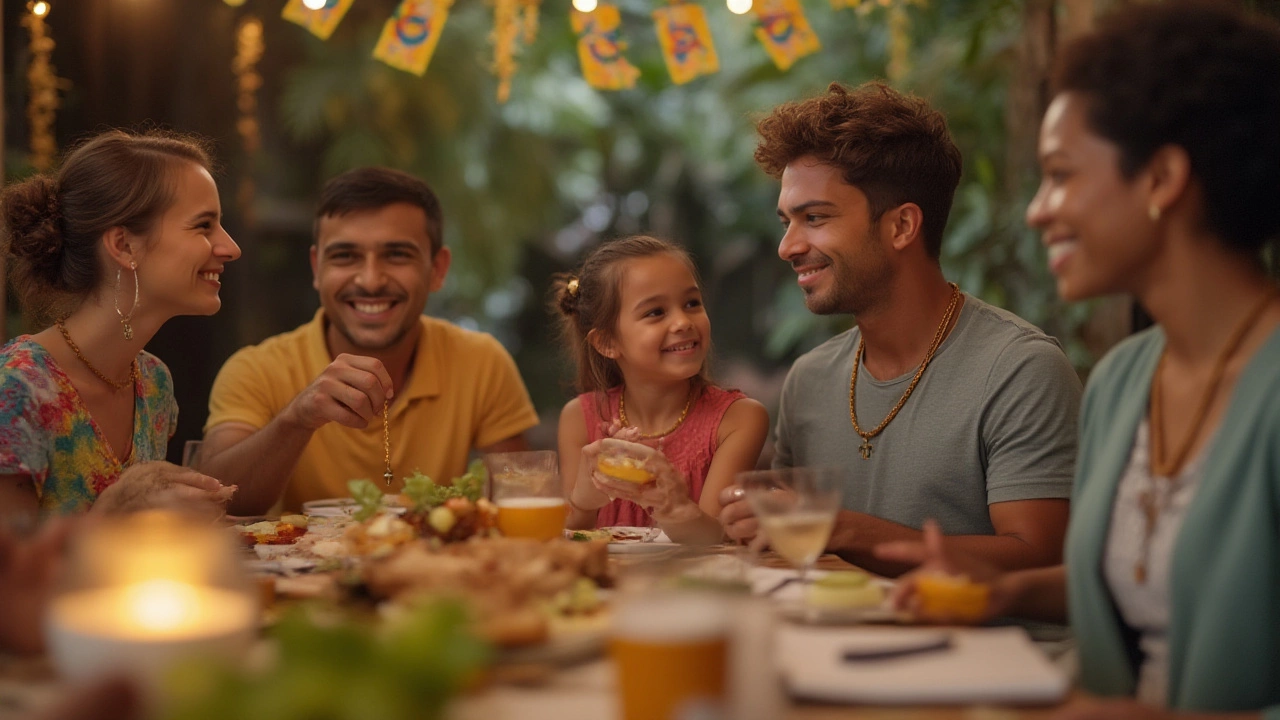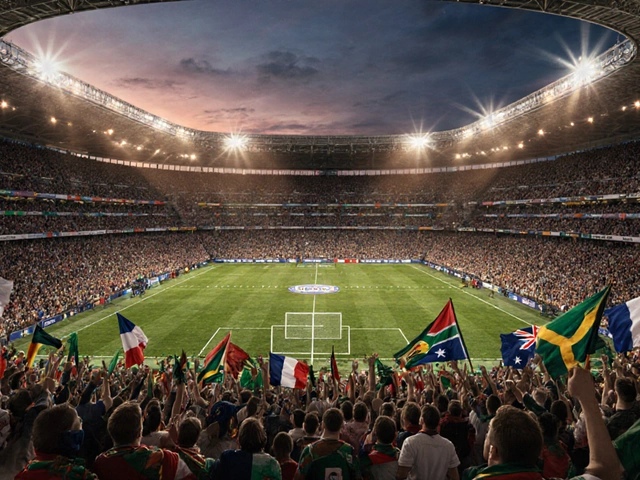
Other July 16, 2025
Brazil Religion: Is Brazil Mostly Catholic or Protestant?
If you visit Brazil, you’ll spot soaring cathedrals and gospel megachurches side by side. City streets burst with saints’ processions one night, evangelical revival tents the next. Religion isn’t just a “nice to know” fact here—it's stitched into the carnival, the soccer matches, the way families celebrate life’s big moments. So, what’s the real story—Is Brazil Catholic or Protestant? The numbers might surprise you, but so will the lived reality. Ready to see which faith dominates the world’s biggest Portuguese-speaking nation?
The Catholic Roots of Brazil
Let’s rewind to 1500, when Portuguese navigators set their boots on the golden sands of what we now call Brazil. They didn’t just bring ships—they hauled over priests, crosses, and the full weight of the Catholic Church. From the first baptism of an indigenous Tupiniquim child to the sprawling baroque cathedrals rising across colonial cities, Catholicism was wired straight into Brazil’s identity. For almost 400 years, Catholicism wasn’t just the main religion; it was the only official faith. Anyone else, in theory, was breaking the law.
The numbers stay wild for most of Brazilian history. In 1872, over 99% of Brazilians identified as Catholic. That dominance lasted deep into the 20th century. Every national holiday honoring a saint? Blame the colonists. Cities named “Our Lady of Something”? Credit the centuries when the Vatican’s influence shaped politics, education, and everyday life. Even soccer legends like Pelé have thanked the Virgin Mary for their lucky feet.
But things started to shift in the 1900s. New waves of immigration brought in German Lutherans, Japanese Buddhists, and all kinds of spiritual flavors. Add big social changes—urbanization, TV evangelists, powerful social movements—and suddenly, Catholic hegemony looked a little wobbly. Even so, if you walk into a classroom or hospital today, odds are good you’ll find a statue of Our Lady of Aparecida looking back at you.
No one should think Catholicism is just history in Brazil. The “Festa Junina,” with its bonfires, costumes, and dances, is a Catholic feast that pulls together Brazil’s north and south, rich and poor. Many folk traditions blend African and indigenous spirits into Catholic rituals, creating celebrations that you won’t find anywhere else.
It’s more than just rituals, though. Catholic parishes run food drives, afterschool programs, and hospitals, especially in poorer areas. According to the 2022 national census, about 51% of Brazilians still call themselves Catholic. That’s still the biggest share—but if you’ve been paying attention, you’ll notice: that number used to be nearly double.
The Rise of Protestant Christianity
Now let’s talk about the surprise—Brazil’s Protestant boom. For most of its history, Protestantism was barely a footnote. The very first Protestant church snuck in during the 19th century, planted by immigrants or foreign diplomats, and grew with Lutheran and Episcopal roots. But the real growth came later, thanks in huge part to Pentecostalism arriving in the early 20th century. These churches didn’t look like gothic cathedrals; they set up shop in storefronts, gyms, and even old movie theaters.
What pulled so many Brazilians in? Part of it was sheer energy. Protestant services brought loud music, dancing in the aisles, and the promise of healing miracles. No middleman priest between you and God—just prayer, spirit, and sometimes, a tambourine. For folks moving to cities, looking for work and community, Pentecostal churches became social hubs. They offered more than faith; they helped with jobs, housing, even basic groceries.
By the late 1970s, Protestant numbers started climbing—fast. The 1991 census found Protestants making up 9% of the population. By 2010, that jumped to 22%. The 2022 census now puts Protestants (including all evangelical strands) at about 32%—nearly one in every three Brazilians. That’s a huge leap in just a few generations.
Some of these megachurches are literal giants. The Universal Church of the Kingdom of God, for instance, claims millions of members and runs its own TV networks. Washy-washy sermons here? Forget it. These churches preach prosperity, faith healing, and winning at life—even on a soccer field. Politicians have noticed; Church leaders now regularly get elected to Congress, and evangelical blocs have a loud voice in national politics.
Keep in mind that “Protestant” in Brazil covers a ton of ground. There are old-school Lutherans in the southern states, hard-line Baptists, urban Pentecostals, and lively Assemblies of God congregations. Many folks mix teachings or migrate between faiths, depending on what fits their life right now.

Religion in Daily Brazilian Life
Labels can be misleading, though. In Brazil, faith isn’t just about what church you go to—it’s in your street, your playlist, your family WhatsApp group. Even those who check “no religion” on surveys might pray to Saint Anthony when they miss the bus. If you want a flavor of how religion plays out daily in Brazil, you have to look past official statistics.
Walk into a city market and you’ll see tiny altars tucked under fruit stands—sometimes with a Catholic saint, sometimes with candles for African or indigenous spirits. On the beaches of Rio, you may stumble into a Candomblé offering to Yemanjá, the goddess of the sea, right at sunrise. Weddings often mix Catholic and Protestant rites, just to keep all the grandparents happy.
Religious festivals? That’s where you’ll notice the lines blurring. Carnival, technically a Catholic event, is also a wild party with Afro-Brazilian roots. The “March for Jesus” in São Paulo draws millions, mixing Christian hip-hop with prayer circles. In small towns, annual festivals in honor of saints or Biblical figures sometimes shut down all traffic for days.
Young people are shaking things up too. A 2023 survey by Datafolha showed that under-30s are less likely to pick “Catholic,” and more likely to say “evangelical,” “spiritual,” or even “nothing at all.” But what does that mean in practice? Many still join family parties for Saint John or go with friends to a youth worship service on Saturday night. Brazilians have a knack for mixing the old and new, the sacred and the everyday.
In tough times, religion gives support networks. Churches run soup kitchens, organize free daycare, and help new arrivals to the big city. When Brazil faced wildfires and floods in 2023, faith communities mobilized—sometimes more quickly than the government.
Religious Demographics: The Numbers
Let’s drop the speculation and get specific. Census data lays it out clearly: Brazil’s religious landscape is changing—fast. The table below shows the official numbers from Brazil’s 2022 census. Look at how dramatically things have shifted in two generations.
| Year | % Catholic | % Protestant | % No religion | % Other |
|---|---|---|---|---|
| 1970 | 91% | 5% | 1% | 3% |
| 1991 | 83% | 9% | 4% | 4% |
| 2000 | 74% | 15% | 7% | 4% |
| 2010 | 64% | 22% | 8% | 6% |
| 2022 | 51% | 32% | 12% | 5% |
Even a decade ago, over six in ten Brazilians were Catholic. Now, it’s just over half. Protestants jumped from single digits to nearly a third. The “no religion” category isn’t just atheists—it includes a spectrum from spiritual seekers to folks who’ve been burned by scandals and want nothing to do with churches.
Here’s a tip when talking to Brazilians about faith: Always listen first. Someone who says “evangelical” might mean anything from strict Pentecostal to a chilled Sunday guitarist at a community church. Catholic might mean a daily mass-goer or someone who goes to church once a year to make grandma happy. The real story is always in the details.
Another interesting twist—where you are in Brazil matters. The north and northeast lean Catholic, with massive processions and centuries-old rituals. Head to the booming urban sprawl of São Paulo or Rio’s outer suburbs, and evangelical megachurches multiply like soccer fields. Down south, you’ll find more European-style Protestants, especially among German and Italian descendants.
Immigration keeps adding to the mix. In recent years, you’ll see more Muslims, Buddhists, and spiritists, especially in big cities shaped by global connections. And Indigenous movements are reclaiming ancient rituals, sometimes blending with Christian ones, sometimes standing entirely apart.

The Influence of Religion on Brazilian Culture and Society
It’s impossible to separate religion from Brazilian culture. Faith shapes music—think samba inspired by African religious beats or the rise of gospel pop stars dominating radio charts. Telenovelas, the nightly dramas everyone watches, often weave in stories of religious conversion, miracles, or spiritual dilemmas. Even Brazilian footballers, from Neymar to humble local heroes, are known to cross themselves before kick-off or point to the sky after a goal.
Politics is a battleground where religion shows its teeth. Evangelical pastors helped elect recent presidents, and debates on moral issues—like abortion and LGBTQ rights—are often driven by faith-based groups. During the pandemic, churches of all stripes played big roles: some preached vaccine skepticism, others turned their grounds into emergency aid stations.
Religion also leaves fingerprints on law and education. Religious instruction is mandatory in many public schools, though students can opt out. Public holidays still honor saints, and even secular events tip their hat to tradition—take the lighting of Rio’s giant Christ the Redeemer statue every Christmas and Easter.
“Religious syncretism” is another uniquely Brazilian twist. Here, you’ll meet folks who cross themselves before entering a Spiritist healing session, or light a candle to St. George (Ogum in Candomblé) during a tough exam week. Even the famous New Year’s Eve tradition of wearing white, tossing flowers into the Atlantic, and making wishes comes from a mix of Catholic and Afro-Brazilian rituals.
If you’re visiting, respect goes a long way. Many churches are open to tourists, but big festivals or worship services aren’t just spectacles—they’re heartfelt moments. Be cool with the camera, dress modestly, and if you’re invited to a family baptism or wedding, expect food, music, and at least three kinds of prayer.
So, is Brazil Catholic or Protestant? The numbers and the street life say: it’s both, and also something totally unique. Walk through a weekend market, join a feast day, or chat with a cab driver, and you’ll see religiosity woven into daily life—just not always as you’d expect.




